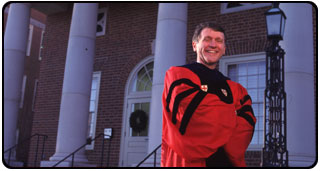First graduates of WFU Divinity School to use degree for a variety of careers

Bill J. Leonard, dean of the Divinity School, says he is proud of the diverse ministerial careers the school’s first graduates have chosen.
For three years, the 20 students in Wake Forest University Divinity School’s first class have studied and worshipped together, following a common path toward graduation. But, come commencement on May 20, they will set out on their own, pursuing a wide variety of careers in the ministry.
The 20 students in the Divinity School’s first graduating class represent seven denominations. They came from six different states to form the school’s inaugural class in 1999.
“Our first students have invested themselves extensively in shaping the school,” said Bill J. Leonard, dean of the Divinity School. “They have been partners with us in affirming and assessing who we are and where we want to be.”
Leonard added that he is proud that the students have chosen a variety of ministerial careers because that diversity illustrates the school’s dedication to ecumenism.
Stephanie Wyatt, a third-year student from Knoxville, Tenn., will work for the Baptist Joint Committee in Washington, D.C., a nonprofit organization that deals with issues of religious liberty and separation of church and state. It represents nine Baptist conventions and conferences in the United States, and some state conventions, individuals and churches.
Three other graduating Divinity School students, Joanne Swanson, Kristin Gerner and Linda Browne, will complete residencies in the Clinical Pastoral Education Program at Wake Forest University Baptist Medical Center. The program certifies students to work as chaplains in hospitals and other settings.
Swanson and Browne are both Baptists and are from Winston-Salem. Gerner, a member of the United Church of Christ, is from Salisbury.
Stan Cross, a third-year student from Roanoake, Va., will work for the Roanoke City Rescue Mission. Cross, a Baptist, will coordinate the mission’s recovery program for transient men.
Some students will use their master of divinity degree to continue work they began before coming to the Divinity School.
Jennie Hemrick, a member of the Presbyterian Church USA who is from Danbury spent 18 years working as a victims’ advocate in the court system before she enrolled in the school in 1999. For her senior project, she is working with the Center for the Prevention of Violence Against Women in Seattle to create training materials to help clergy respond to women and families who have survived violence like rape and domestic abuse.
Hemrick is seeking ordination, and hopes to work in ecumenical social ministry.
Several third-year Divinity School students are still interviewing for positions in congregational ministry and other types of ministry. Leonard says the Divinity School’s ecumenical approach equips students with the ability to function in a world where denominational systems are changing. Now that several Protestant denominations officially recognize each other’s ordinations, theological graduates have even more flexibility when looking for jobs, he said, but that comes with the added responsibility of knowing about different faith traditions.
The Divinity School has a total of 70 students from 11 different denominations studying full-time to earn the master of divinity degree. The program lasts three years and includes summer study.
The Divinity School curriculum includes instruction in traditional seminary subjects like biblical studies, church history, theology, homiletics (the art of preaching), spirituality and pastoral care taught by full-time Divinity School faculty. Because the school is set within the larger context of the university, students are also able to study under other Wake Forest faculty. Divinity students have taken courses in the religion and classics departments, at the School of Law and in Wake Forest Baptist Medical Center’s Clinical Pastoral Education program.
To complement the traditional curriculum, the Divinity School also offers a unique vocational development component that requires intensive participation through all three years of study, Leonard said. The program provides a series of professional development activities and opportunities for reflection on the ministry. Through this component, students work in a church or other ministry setting and are paired with mentors in the community.
The school also offers on-site courses and multicultural ministry seminars in Cuba,
New York City and rural Appalachia. Another unique component is the first-year
colloquium that covers emerging issues in theology and ministry.
The Divinity School faculty mirrors the students’ diversity, both in background and denominational affiliation. The faculty includes Baptists, Presbyterians, members of other denominations and a Catholic Benedictine monk. The school also recently added a Jewish studies professorship that will be taught by visiting scholars.
For more information about the Divinity School, visit its Web site at www.wfu.edu/divinity
Categories: Awards & Recognition, University Announcements
Media Contact
Wake Forest News
media@wfu.edu
336.758.5237



